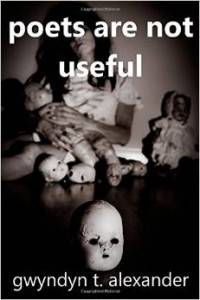lip lit: poets are not useful
Although a powerful form of expression, poetry remains a misunderstood and underappreciated art form. This deeply personal publication by Gwyndyn Alexander is essentially an answer to a question – put forth by a man of, in her words, the ‘scientific sort’ – querying the function of poetry. What is a poet? What is the point of poetry? What even is it that poets do – are they useful?
Alexander retorts in her publication that duct tape, screwdrivers and microwaves are ‘useful’, but poets are iconoclasts. The verse writer questions and challenges societal conventions; they are empaths, sensitive beings, time travellers. Alexander writes with a candour and honesty that is easily digestible for the average reader. You can disregard any preconceived notions you may have of poetry being mystifying, incomprehensible, ridiculous or disconnected, as this new collection is relatable and accessible.
Alexander explores the oppression of women, her own experiences, present conflicts in her life as well as her recovery from a traumatic childhood and episodes of abuse. With each entry beginning with ‘Poet as’, the author presents a new viewpoint per poem, or new perception on each page. The writing is visceral and raw, self-reflective, brave and questioning.
I find a sense of comfort as I read of her experiences, and something consoling and touching within the vulnerability and simplicity. It’s almost as if a lot of it has been strung together in an emotionally heightened state, which I know at least from experience, can be a boundless way to get things out. Conflict can be a great prompt. Alexander implodes in poet as atom bomb:
Ink from my pen, or blood from my veins,
I am uranium.
You are the spark that sets me off,
Words flying everywhere…
Tower Zebra Spam
Call me Oppenheimer,
Tearing down matter,
Creating, in one soft flash,
Visions and white noise.
Watch me explode
Stand out sections are ‘Poet as Cartographer’ and ‘Poet as Machine’, where Alexander touches interestingly on the creative process. In ‘Poet as Portrait’, she stares down the trajectory of her past, reflecting on an experience of being captured in a static and timeless painted portrait. She ponders the disconnect she feels upon viewing this image of herself, which for her, seemed almost a world away. Between herself now, and the solemn youth she sees at five, she writes:
sometimes I feel
that flat image is truer to me
than the me I push through life,
my self as marionette
It is a tangible torture that I’m sure a lot of us feel, as we reflect nostalgically on our past decisions, choices and being. We tend to just fly through life on auto-pilot; we maintain jobs and we raise families and we make plans and we pay expenses. Reflective periods like Alexander’s can become very poignant and important.
The whole idea of good poetry is to stimulate thought and make you feel something, and no matter how it’s been put together or whatever way it’s been done, if the work has been able to move you in some way then as far as I’m concerned it’s great poetry. Alexander has managed to do this, in a darkly stimulating way.
Poets are oysters.
We encapsulate pain
Isolate it
Transform it into art.
I am making
A string of pearls
That can wrap this city,
Adorn all these ghosts.
You can run them through your fingers,
This rosary of byzantine scars.
Poets are not useful, but essential.


